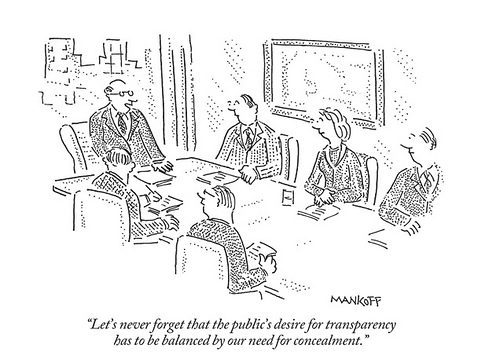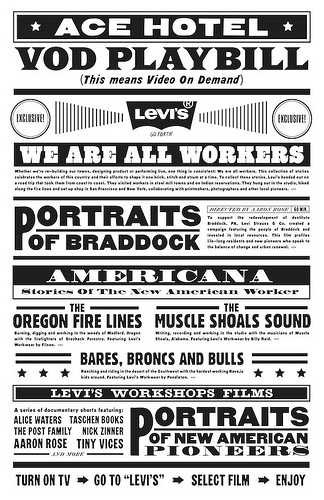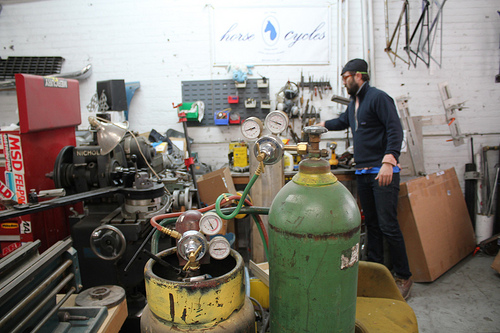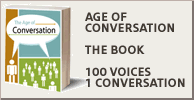This is a nice presentation from "Account Planning Guru", Paul Feldwick, from a London TEDx conference, where he provides an interesting perspective on the problems surrounding the definition of creativity.
He touches on the obvious problem of its very intangibility making it a tough concept for business to grasp, but goes on to explain how he thinks its been wrongly pigeon-holed in the "innovation" space, which implies breakthrough thinking.
Using Elvis as an example, he shows how he wasn't especially original, but there was something about his "presence" that made him interesting.
Feldwick believes the knock-on impact, for advertising, of poorly defined "creativity" is to always push for originality. Instead, creative needs to be thinking about "artistry", rather than originality as the way to develop ideas that generate a strong emotional response.
Posted by Ed Cotton
Paul Graham's piece on Yahoo's demise is a must read for anyone looking for answers to the fail from grace of a once iconic brand.
Graham's rationale for Yahoo's failure is put down essentially one thing; its lack of a "Hacker Culture". It didn't have brilliant engineers at the heart and soul of its organization and it tried to make do without keeping and attracting the best.
Interestingly, this is the opposite of Facebook and perhaps, one can argue, the very reason for its success.
Back in October of 2009, Y-Combinator invited Zuckerberg to speak at its Start-Up School and he was asked the question about keeping and attracting talent.
This was his response.
"Our goal isn’t necessarily to keep people forever. There are companies that train people really well. A lot of Harvard people went on to McKinsey. A lot of people went to IBM because that was the best place to learn sales. A lot of people go to USC to learn how to play football. One of the things at Facebook is have a place where it’s one of the best places to learn how to build stuff. If you want to learn how to build really good products and practices and have a large impact, I would argue there’s no better place to do that than at Facebook.
If people want to come here for one, two, or three years. Steve Chen, who founded YouTube, was working on Facebook before. I’m not encouraging people to work at Facebook to leave. But I think you learn valuable skills. We’re not pretending we’re building a company that hackers are going to want to work at forever. I want to be a part of building some institutions to be great hacker institutions in the long-term."
Zuckerberg is making two things clear from this statement.
1. He wants to hire hackers
2. His promise to to his talent is clear, it's simply the best place to learn how to build stuff. If you are an engineer, what more could you ask for?
There's much more to this than meets the eye; it's the philosophy of "Hacker Culture" that not only applies to the stuff you build, but how you approach business overall.
You kind of want "hackers" everywhere, because they are never satisfied with the status-quo and always looking to improve and better things. They never sit still and they constantly making the future.
While it's easy to see why "Hacker Cultures" scare most of corporate America, but it seems like the thing that a number of companies need more of right now.
An interesting exercise could be to define and codify the hacker skills set, so it would make sense for non-engineering types.
The reality is every company one day in the very near future will need an army of internal hacker engineers.
The difference is, these won't be the "digital cowboys" in the back office, they will be running the show.

John Naughton in Monday's Guardian wrote about the WikiLeaks saga and concluded his piece with a statement about the new reality.
"But politicians now face an agonising dilemma. The old, mole-whacking approach won't work. WikiLeaks does not depend only on web technology. Thousands of copies of those secret cables - and probably of much else besides - are out there, distributed by peer-to-peer technologies like BitTorrent. Our rulers have a choice to make: either they learn to live in a WikiLeakable world, with all that implies in terms of their future behaviour; or they shut down the internet. Over to them.
While most of the talk has centered around the massive political ramifications of the leaks, there's also the corporate impact. Wikileaks was supposedly primed and ready to leak some very damaging internal documents from a leading bank, but It remains to be seen if this now happens.
Irrespective, of the future of the founder of WikiLeaks or of the organization itself, the trend towards greater transparency is out there as are the means to make it happen.
Corporations and their brands will have to assume a position, which will have a significant impact on their relationship with consumers in a more open, dynamic and human world.
Here are some thoughts that brands need to consider in the light of WikiLeaks
1. What do they open up and what do they close?
2. By operating a "lock down" mentality- do they risk damaging their brand?
3. How do they become more transparent?
4. What tools would they use to display and demonstrate this transparency?
5. In what ways might greater transparency provide competitive advantage?
6. How do they control employees- what can they say and where can they say it?
7. Response- How do you and should you respond to rumors?
8. How would you respond to a massive leak that reveals multiple issues?
I am assuming some of these questions might be part of a social media audit or an audit by a PR company, but I imagine they might be looking at things through different lenses, pre-Wikileaks; one might be a single issue crisis management and the other might simply be the the competitive pressure to engage in social media and the new rule sets that surround it.
A WikiLeaks scenario is a game changer that re-writes the old rules. It's a situation where company secrets are dumped on such a massive scale that they rock the core of the corporation, forcing its very existence called into question. This would be tough and an almost impossible scenario for anyone to respond to, but it's a potential reality.
However, if you have some plan in place and also make steps to becoming a more transparent organization, perhaps you could anticipate this potential nightmare scenario, a little better.
The real response from corporations to WikiLeaks, I believe will be a little different. While Naughton suggests in his Guardian piece that politicians don't really have the option to shut down the internet, inside corporations they won't shut the internet down, but access might be limited and usage monitored, lawyers will become more aggressive and there will be more of a "lock down" approach. They will do anything and everything to stop information from escaping.
The brand consultants and the legions of planners who've recently been actively arguing for their brands to be more open, will soon discover that WikiLeaks might not be the force for change they were hoping it could have been. Instead they will find clients holding it up as a reason and an excuse to do the opposite.
While the negative impact on efforts for radical transparency will be obvious, i am also going to assume that even doing interesting and more open experiments with social media has just gotten that much tougher.
Please note that the image above was stolen from Colin Drummond's Posterous.
It was way better than the original screenshot of Wikileaks
Posted by Ed Cotton

When your brand attracts a steady stream of other brands who want to hang out with you, you know you've got something.
This is the case with the Ace Hotel which has carved out a distinctive brand in the world of cookie-cutter hotel chains, by having a strong sense of itself and a clear understanding of its audience.
When a brand attracts an interesting audience, other brands want to connect because they desire access.
Ace clearly gets this and instead of doing the usual with its in-room TV service, it curates its own content and it's therefore not surprising that Levi's wants to be in and on that media.
I am sure the Ace Hotel wouldn't appear on any media schedule from Madison Avenue media planners and if you ask for reach and frequency numbers, the Ace might ask you what you mean, but those who know Ace, know the union makes perfect sense.
So, some questions for you and your brands
1. Does your brand attract an interesting and potentially valuable audience that could be attractive to other brands? Who do you think they are? What could you being doing together? Do you have a "media" opportunity for them?
2. Instead of thinking of the media universe think of your brand's brand universe- Which other brands are closest to yours? What connection points exist between your brand and theirs? How could you work together? Do they have "media" you could use?
Posted by Ed Cotton
It's pretty tough after such an eclectic experience to gather thoughts and make sense of it all, but I thought I would have a try, hence the above presentation.
Please consider this a very early draft that can be built upon by readers and attendees with alternate or additional perspectives.
The deck is an attempt to focus and relate the content directly to communications and branding.
It ends by asking 10 questions that I feel are good primer to see if we and our clients are approaching communication from a "Makers" perspective.
Posted by Ed Cotton

We have 5 tickets left for tomorrow's event!!!
The recent blog post on "Why agencies need labs" forced me to re-think the idea of our "Meet the Makers" conference in NYC on December 3rd.
It struck me that conference is the wrong term, it smacks of the past, boredom, lack of interaction, stale sandwiches, poor lighting and a lousy venue.
"Lab for the Day" is much better term and truer to what we plan to deliver.
Inside the corporate world, the mind is somewhat constrained by the realities of the endless "to do" list- space for thinking and inspiration is sometimes hard to come by.
Our "lab" is a chance to change that.
To explain more, our lab is about "Making" and is designed to provide inspiration from the makers themselves, those who have work directly with them and is all about about the act of making. The "lab" seeks to provide some rules, tools and instruction sets on how to "make" good things.
And in true lab style, we will be conducting a number of experiments.
Here are the key themes and speaker specifics.
Making and Re-Making Brands
Ashley Alsup, has spent time making-over Burger King at CPB and has some interesting thoughts on why corporate America needs to re-make itself and how to do it.
Mark Barden of Eat Big Fish is going to do an experiment with the audience to get them to help him think and re-think about a brand he's personally involved with.
Real Makers and Creators
Scott Belsky, the founder of Behance, recently wrote the best-seller, "Making Ideas Happen", is going to tell us how we can all have best sellers.
Jim Wexler makes games for a living, he's going to be talking about the ingredients for good games and talk about how and why games are going invade and become a much bigger part of our lives.
Thomas Callahan left his job in the corporate art world to make bikes by hand going to tell us what he does and why he does it.
Time Magazine was one of the first magazines to re-make itself for the iPad, the most intriguing new media platform for years. Time's DW Pine is going to tell us how they did it with considerable constraints and what they are learning about how to evolve the experience.
For another take on the future of magazine publishing, Sarah Rich is going to be sharing lessons from the 48 hour magazine project, Longshot, which she describes as follows..
In May 2010, we conducted a two-day media experiment. 8,000 people signed up, 1,500 submissions came in, 35 editors selected 70 pieces to fill a 60-page magazine.
People liked it. We broke our distributor's sales records, received positive reviews in The New York Times, PBS, and the Village Voice, and won a Knight-Batten Award for Innovation in Journalism. Here, we present selected work from the print edition of Issue Zero.
Frank Rose has spent the last two and a half years researching the past, present and future of storytelling for his new book, "The Art of Immersion". He's talked to James Cameron, the creators of Lost , the people behind Tron Legacy, and many others, about the evolving process of storytelling and what it's going to take to tell a compelling story in the C21st.
Gary Hirsch gets people "out of their shells" for a living and inspires them to develop great ideas with others. He's going to lead an experiment to get us to create a character, one of the most critical components of any story.
Creative Output and Opportunity
Finally, Piers Fawkes of PSFK is going to challenge the audience to create compelling ideas for a fascinating project for the United Nations.
We believe it will be a fascinating day and a "lab" in the true sense of the word.
If you are interested in registering for the few remaining places, you can find out more here.
We are thankful for the support of our media sponsor, PSFK
Posted by Ed Cotton
